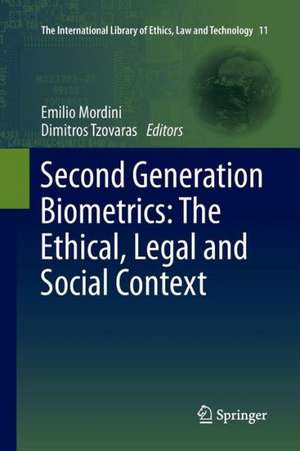Second Generation Biometrics: The Ethical, Legal and Social Context: The International Library of Ethics, Law and Technology, cartea 11
Editat de Emilio Mordini, Dimitros Tzovarasen Limba Engleză Paperback – 11 iun 2014
This book is the first ever published on ethical, social and privacy implications of second generation biometrics. Authors include both distinguished scientists in the biometric field and prominent ethical, privacy and social scholars. This makes this book an invaluable tool for policy makers, technologists, social scientists, privacy authorities involved in biometric policy setting. Moreover it is a precious instrument to update scholars from different disciplines who are interested in biometrics and its wider social, ethical and political implications.
| Toate formatele și edițiile | Preț | Express |
|---|---|---|
| Paperback (1) | 643.65 lei 6-8 săpt. | |
| SPRINGER NETHERLANDS – 11 iun 2014 | 643.65 lei 6-8 săpt. | |
| Hardback (1) | 650.04 lei 6-8 săpt. | |
| SPRINGER NETHERLANDS – 4 mai 2012 | 650.04 lei 6-8 săpt. |
Din seria The International Library of Ethics, Law and Technology
- 15%
 Preț: 700.75 lei
Preț: 700.75 lei - 20%
 Preț: 982.84 lei
Preț: 982.84 lei - 15%
 Preț: 642.83 lei
Preț: 642.83 lei - 18%
 Preț: 832.11 lei
Preț: 832.11 lei -
 Preț: 374.37 lei
Preț: 374.37 lei - 15%
 Preț: 647.73 lei
Preț: 647.73 lei -
 Preț: 374.76 lei
Preț: 374.76 lei -
 Preț: 395.47 lei
Preț: 395.47 lei - 15%
 Preț: 586.23 lei
Preț: 586.23 lei - 15%
 Preț: 583.28 lei
Preț: 583.28 lei - 5%
 Preț: 1098.84 lei
Preț: 1098.84 lei - 15%
 Preț: 581.33 lei
Preț: 581.33 lei - 15%
 Preț: 589.14 lei
Preț: 589.14 lei - 15%
 Preț: 693.57 lei
Preț: 693.57 lei - 18%
 Preț: 725.43 lei
Preț: 725.43 lei - 15%
 Preț: 642.68 lei
Preț: 642.68 lei - 15%
 Preț: 640.37 lei
Preț: 640.37 lei -
 Preț: 288.27 lei
Preț: 288.27 lei - 24%
 Preț: 644.82 lei
Preț: 644.82 lei - 18%
 Preț: 736.94 lei
Preț: 736.94 lei - 15%
 Preț: 640.37 lei
Preț: 640.37 lei - 15%
 Preț: 636.12 lei
Preț: 636.12 lei - 15%
 Preț: 638.24 lei
Preț: 638.24 lei - 5%
 Preț: 713.18 lei
Preț: 713.18 lei - 15%
 Preț: 637.78 lei
Preț: 637.78 lei
Preț: 643.65 lei
Preț vechi: 757.24 lei
-15% Nou
Puncte Express: 965
Preț estimativ în valută:
123.16€ • 128.59$ • 101.93£
123.16€ • 128.59$ • 101.93£
Carte tipărită la comandă
Livrare economică 05-19 aprilie
Preluare comenzi: 021 569.72.76
Specificații
ISBN-13: 9789400797239
ISBN-10: 9400797230
Pagini: 364
Ilustrații: X, 354 p.
Dimensiuni: 155 x 235 x 19 mm
Greutate: 0.51 kg
Ediția:2012
Editura: SPRINGER NETHERLANDS
Colecția Springer
Seria The International Library of Ethics, Law and Technology
Locul publicării:Dordrecht, Netherlands
ISBN-10: 9400797230
Pagini: 364
Ilustrații: X, 354 p.
Dimensiuni: 155 x 235 x 19 mm
Greutate: 0.51 kg
Ediția:2012
Editura: SPRINGER NETHERLANDS
Colecția Springer
Seria The International Library of Ethics, Law and Technology
Locul publicării:Dordrecht, Netherlands
Public țintă
ResearchCuprins
Foreword
Viviane Reding - Vice-President of the European Commission, EU Commissioner for Justice, Fundamental Rights and Citizenship
General Introduction
Emilio Mordini, Dimitrios Tzovaras and Holly Ashton
SECTION ONE: “Foundations and Issues”
Epistemological Foundation of Biometrics
Giampaolo Ghilardi - Università di Milano
Flavio Keller - Professor of Human Physiology, Università Campus Bio-Medico
Biometric Recognition: an Overview
Anil K. Jain – Professor at Departments of Computer Science & Engineering, Electrical & Computer Engineering and Statistics & Probability at Michigan State University
Ajay Kumar - The Hong Kong Polytechnic University, Hung Hom, Hong Kong
Biometrics, Privacy and Agency
Annemarie Sprokkereef - Researcher at Tilburg Institute for Law, Technology, and Society
Paul de Hert - Professor of Law Faculty of Law and Criminology of Vrije Universiteit Brussel
SECTION TWO: “Emerging Biometrics and Technology Trends”
Gait and Anthropometric Profile Biometrics: A Step Forward
Dimosthenis Ioannidis & Dimitrios Tzovaras - Informatics and Telematics Institute, Centre for Research and Technology Hellas
Gabriele Dalle Mura, Gaetano Valenza & Alessandro Tognetti – Interdepartmental Research Centre "E. Piaggio", Faculty of Engineering, University of Pisa
Marcello Ferro - Institute of Computational Linguistics “A. Zampolli” (ILC) National Research Council (CNR) of of Pisa
Giovanni Pioggia - Institute of Clinical Physiology of CNR
Activity and Event Related Biometrics
Anastasios Drosou & Dimitrios Tzovaras – Informatics and Telematics Institute, Centre for Research and Technology Hellas
ElectrophysiologicalBiometrics: Opportunities and Risks
Alejandro Riera, Stephen Dunne, Iván Cester & Giulio Ruffini - Starlab Barcelona SL
Intelligent Biometrics
Farzin Deravi - Reader in Information Engineering Department of Electronics at the University of Kent
SECTION THREE: “Identity, Intentions and Emotions”
Behavioural Biometrics and Human Identity
Ben Schouten & Rob van Kranenburg - Fontys University of Applied Science
Albert Ali Salah - University of Amsterdam
Behavioural Biometrics and Risk Identification
Guenter Schumacher - European Commission – Joint Research Centre. Institute for the Protection and Security of the Citizen
Facial Recognition, Facial Expression and Intention Detection
Massimo Tistarelli - Computer Vision Laboratory, University of Sassari
Susan E. Barrett - Lehigh University, Bethlehem, PA, U.S.A.
Alice O’Toole - University of Texas at Dallas, Richardson, TX, U.S. A.
The Transparent Body - Medical Information, Physical Privacy and Respect for Body Integrity
Emilio Mordini & Holly Ashton – Centre for Science, Society, and Citizenship, Rome
SECTION FOUR: “New Biometrics in Context”
Security in the Danger Zone: Normative Issues of Next Generation Biometrics
Irma Van der Ploeg – Professor Infonomics & New Media Research Center, Zuyd University
The Dark side of the Moon : Accountability, Ethics and New Biometrics
Juliet Lodge - Director of the Jean Monnet European Centre of Excellence, Institute for Communication Studies, University of Leeds
Conclusions
Emilio Mordini
Greek DPA Decision for ACTIBIO pilots in Greece
Viviane Reding - Vice-President of the European Commission, EU Commissioner for Justice, Fundamental Rights and Citizenship
General Introduction
Emilio Mordini, Dimitrios Tzovaras and Holly Ashton
SECTION ONE: “Foundations and Issues”
Epistemological Foundation of Biometrics
Giampaolo Ghilardi - Università di Milano
Flavio Keller - Professor of Human Physiology, Università Campus Bio-Medico
Biometric Recognition: an Overview
Anil K. Jain – Professor at Departments of Computer Science & Engineering, Electrical & Computer Engineering and Statistics & Probability at Michigan State University
Ajay Kumar - The Hong Kong Polytechnic University, Hung Hom, Hong Kong
Biometrics, Privacy and Agency
Annemarie Sprokkereef - Researcher at Tilburg Institute for Law, Technology, and Society
Paul de Hert - Professor of Law Faculty of Law and Criminology of Vrije Universiteit Brussel
SECTION TWO: “Emerging Biometrics and Technology Trends”
Gait and Anthropometric Profile Biometrics: A Step Forward
Dimosthenis Ioannidis & Dimitrios Tzovaras - Informatics and Telematics Institute, Centre for Research and Technology Hellas
Gabriele Dalle Mura, Gaetano Valenza & Alessandro Tognetti – Interdepartmental Research Centre "E. Piaggio", Faculty of Engineering, University of Pisa
Marcello Ferro - Institute of Computational Linguistics “A. Zampolli” (ILC) National Research Council (CNR) of of Pisa
Giovanni Pioggia - Institute of Clinical Physiology of CNR
Activity and Event Related Biometrics
Anastasios Drosou & Dimitrios Tzovaras – Informatics and Telematics Institute, Centre for Research and Technology Hellas
ElectrophysiologicalBiometrics: Opportunities and Risks
Alejandro Riera, Stephen Dunne, Iván Cester & Giulio Ruffini - Starlab Barcelona SL
Intelligent Biometrics
Farzin Deravi - Reader in Information Engineering Department of Electronics at the University of Kent
SECTION THREE: “Identity, Intentions and Emotions”
Behavioural Biometrics and Human Identity
Ben Schouten & Rob van Kranenburg - Fontys University of Applied Science
Albert Ali Salah - University of Amsterdam
Behavioural Biometrics and Risk Identification
Guenter Schumacher - European Commission – Joint Research Centre. Institute for the Protection and Security of the Citizen
Facial Recognition, Facial Expression and Intention Detection
Massimo Tistarelli - Computer Vision Laboratory, University of Sassari
Susan E. Barrett - Lehigh University, Bethlehem, PA, U.S.A.
Alice O’Toole - University of Texas at Dallas, Richardson, TX, U.S. A.
The Transparent Body - Medical Information, Physical Privacy and Respect for Body Integrity
Emilio Mordini & Holly Ashton – Centre for Science, Society, and Citizenship, Rome
SECTION FOUR: “New Biometrics in Context”
Security in the Danger Zone: Normative Issues of Next Generation Biometrics
Irma Van der Ploeg – Professor Infonomics & New Media Research Center, Zuyd University
The Dark side of the Moon : Accountability, Ethics and New Biometrics
Juliet Lodge - Director of the Jean Monnet European Centre of Excellence, Institute for Communication Studies, University of Leeds
Conclusions
Emilio Mordini
Greek DPA Decision for ACTIBIO pilots in Greece
Textul de pe ultima copertă
While a sharp debate is emerging about whether conventional biometric technology offers society any significant advantages over other forms of identification, and whether it constitutes a threat to privacy, technology is rapidly progressing. Politicians and the public are still discussing fingerprinting and iris scan, while scientists and engineers are already testing futuristic solutions. Second generation biometrics - which include multimodal biometrics, behavioural biometrics, dynamic face recognition, EEG and ECG biometrics, remote iris recognition, and other, still more astonishing, applications – is a reality which promises to overturn any current ethical standard about human identification. Robots which recognise their masters, CCTV which detects intentions, voice responders which analyse emotions: these are only a few applications in progress to be developed.
This book is the first ever published on ethical, social and privacy implications of second generation biometrics. Authors include both distinguished scientists in the biometric field and prominent ethical, privacy and social scholars. This makes this book an invaluable tool for policy makers, technologists, social scientists, privacy authorities involved in biometric policy setting. Moreover it is a precious instrument to update scholars from different disciplines who are interested in biometrics and its wider social, ethical and political implications.
This book is the first ever published on ethical, social and privacy implications of second generation biometrics. Authors include both distinguished scientists in the biometric field and prominent ethical, privacy and social scholars. This makes this book an invaluable tool for policy makers, technologists, social scientists, privacy authorities involved in biometric policy setting. Moreover it is a precious instrument to update scholars from different disciplines who are interested in biometrics and its wider social, ethical and political implications.
Caracteristici
One of the first books on second generation biometrics and the first on ethical, social and privacy implication of them Includes chapters from neuroscientists, psychologists, psychiatrists, jurists, social scientists, philosophers, ethicists, as well as technologists A relevant, thought provoking, and intellectually challenging text
























